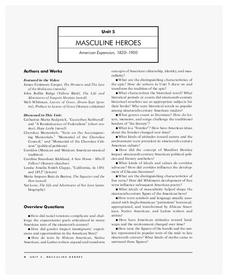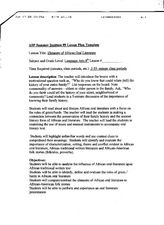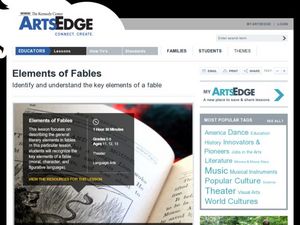Trinity University
Julius Caesar: The Power of Persuasion
"Friend, Romans, countrymen, lend me your ears..." Those words begin one of the most persuasive speeches in literature. Explore the elements of persuasion in a series of lessons related to William Shakespeare's Julius Caesar. In addition...
Curated OER
1984 by George Orwell
Readers of Nineteen Eighty-Four engage in a close reading exercise that directs their focus to the key details Orwell provides in the opening paragraphs to introduce his dystopian society. The included worksheeet is divided into three...
Curated OER
Rudyard Kipling's Rikki-Tikki-Tavi: Mixing Words and Pictures
Create meaningful illustrations to accompany stories in a web-based art and literacy lesson plan focused on "Rikki-Tikki-Tavi" by Rudyard Kipling. The class takes a virtual art safari with the Museum of Modern Art and then discusses how...
Annenberg Foundation
Masculine Heroes
What were the driving forces behind American expansion in the nineteenth century, and what were its effects? Scholars watch a video, read biographies, engage in discussion, write journals and poetry, draw, and create a multimedia...
Curated OER
Literature: Porgy and Bess
Learners examine the various portrayals of African-Americans in literature, focusing on the opera, Porgy and Bess. They conduct Internet research on African-American culture between the two World Wars. Students write fictional or...
Star Wars in the Classroom
"Shakespeare and Star Wars": Lesson Plan Day 12
Class members compare the final 30 minutes of Lucas's Star Wars: A New Hope with Act V of Doescher's play, William Shakespeare's Star Wars: Verily, A New Hope and consider how the choice of media influences viewers' impression of the...
Vanier College
Analyzing Short Stories/Novels
Good questions can help focus readers' attention on the elements writers use to add depth to their stories. The questions on this worksheet do just that and encourage readers to think critically about a story and author's purpose.
Curated OER
Elements of African Oral Literature
Ninth graders examine the importance of family history. In this Language Arts activity, 9th graders read and discuss African oral literature with a focus on the roles of griots. Students compare /contrast the elements of African oral...
Curated OER
Social Movements in American Politics
In this term paper assignment worksheet, students follow the provided steps and outline that requires them to research and write a paper about social movements in American politics.
Curated OER
"Exploring Shakespeare" An Introduction of Character and "Hamlet"
Young scholars examine the literary terms "round character" and "characterization" through the play "Hamlet" by William Shakespeare. They view and discuss examples of clip art, video, and comic strips, and describe the character traits....
Curated OER
Writing Myths
Learners read and write myths. In this world mythology activity, students read and analyze myths from various cultures and then recognize their attributes as they write their own myths that explain natural phenomena.
Curated OER
Reading and Activity Suggestions for The Adventures of Tom Sawyer
Students learn about characterization techniques in The Adventures of Tom Sawyer. In this Adventures of Tom Sawyerlesson, students write a description of one character through the eyes of another character and identify scenes that give...
Curated OER
Elements of Fables
Students explore the attributes of fables. In this literature instructional activity, students read several fables and identify the moral instructional activity, characterization, and figurative language in each. Students then retell...
Curated OER
Graphic Organizer Collection: Character
In this collection of graphic organizers for a literature unit, students will complete 22 different graphic organizers on the topic of character development. For example, this collection includes character analysis and various attribute...
Curated OER
Frederick Lesson Plan
Students enjoy Leo Lionni's illustrations in Frederick and watching how Frederick uses his imagination. In this Frederick lesson plan, students practice dramatic techniques as they retell traditional literature.
Curated OER
Because of Winn-Dixie Scrapbook
Here is a fun resource that your kids will love. While reading the book Because of Winn-Dixie, they analyze the story's main characters by creating an online scrapbook. The purpose is to have them identify character traits and use...
ReadWriteThink
Beyond the Story: A Dickens of a Party
It's time to party like it's 1899! Incorporate a research-based celebration of the Victorian Era into your unit on A Christmas Carol by Charles Dickens. After learners read the novella or view a production of the play, they craft a...
Curated OER
Become a Character: Adjectives, Character Traits, and Perspective
High schoolers use an online chart to match the character traits of a character in a book they are reading with specific actions the character takes. Students then work in pairs to "become" one of the major characters in a book and...
Curated OER
Character in a Box
Partners choose, research, and analyze fictional or historical characters and design character life boxes to represent them. They also compose a rhyme royal, which they understand inductively by deconstructing examples. Based largely on...
Star Wars in the Classroom
"Shakespeare and Star Wars": Lesson Plan Day 6
How can a screenplay create meaning and drama in ways that other forms of writing cannot? That is the question class members must answer as they compare the cantina scene of the screenplay for George Lucas's Star Wars: A New Hope with...
Curated OER
Literature: Watching Anna
Students view the PBS presentation of Leo Tolstoy's, "Anna Karenina." Prior and after each episode, they discuss plot and characterization and in one lesson, use adjectives to describe each of the main characters. Then, students create...
Curated OER
Mystic Lands: Maya: Messages in Stone
Students explore an ancient Mayan city. In this world history lesson, students watch a video about the ancient Mayan civilization, discussing information prior to and after watching the video. Students then come to understand more about...
National Endowment for the Humanities
Folklore in Zora Neale Hurston's Their Eyes Were Watching God
Learners define folklore, folk groups, tradition, and oral narrative. They identify traditional elements in Their Eyes Were Watching God Analyze and understand the role of traditional folkways and folk speech in the overall literary...
Peace Corps
Starting Off the Day (and School Year) in Ukraine
Students compare the first day of school in Ukraine with the first day of school in the United States, including the challenges students and teachers both face in each country. They respond in class, in their journals, to the following...

























